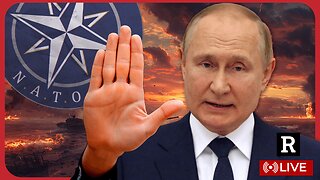Josef Stalin's Victory Broadcast (May 9th1945) [Subtitled]
Iosif Stalin, Speech Delivered at a Meeting of Voters of the Stalin Electoral District, Moscow.
February 9, 1946
Comrades!
Eight years have passed since the last elections to the Supreme Soviet.
This has been a period replete with events of a decisive nature.
The first four years were years of intense labor on the part of Soviet people in carrying out the Third Five-Year Plan.
The second four years covered the events of the war against the German and Japanese aggressors — the events of the Second World War. Undoubtedly, the war was the main event during the past period.
It would be wrong to think that the Second World War broke out accidentally, or as a result of blunders committed by certain statesmen, although blunders were certainly committed.
As a matter of fact, the war broke out as the inevitable result of the development of world economic and political forces on the basis of present-day monopolistic capitalism.
Marxists have more than once stated that the capitalist system of world economy contains the elements of a general crisis and military conflicts, that, in view of that, the development of world capitalism in our times does not proceed smoothly and evenly, but through crises and catastrophic wars.
The point is that the uneven development of capitalist countries usually leads, in the course of time, to a sharp disturbance of the equilibrium within the world system of capitalism, and that group of capitalist countries regards itself as being less securely provides with raw materials and markets usually attempts to change the situation and to redistribute “spheres of influence” in its own favor — by employing armed force.
As a result of this, the capitalist world is split into two hostile camps, and war breaks out between them.
Perhaps catastrophic wars could be avoided if it were possible periodically to redistribute raw materials and markets among the respective countries in conformity with their economic weight by means of concerted and peaceful decisions. But this is impossible under the present capitalist conditions of world economic development.
Thus, as a result of the first crisis of the capitalist system of world economy, the First World War broke out; and as a result of the second crisis, the Second World War broke out.
This does not mean, of course, that the Second World War was a copy of the first.
On the contrary, the Second world differed substantially in character from the first. It must be borne in mind that before attacking the Allied countries the major fascist states — Germany, Japan and Italy — destroyed the last remnants of bourgeois-democratic liberties at home and established there a cruel terrorist regime, trampled upon the principle of the sovereignty and free development of small countries, proclaimed as their own the policy of seizing foreign territory, and shouted from the housetops that they were aiming at world domination and the spreading of the fascist regime all over the world; and by seizing Czechoslovakia and the central regions of China, the Axis Powers showed that they were ready to carry out their threat to enslave all the freedom-loving peoples. In new of this, the Second World War against the Axis Powers, unlike the First World War, assumed from the very outset the character of an anti-fascist war, a war of liberation, one of the tasks of which was to restore democratic liberties.
The entry of the Soviet Union into the war against the Axis Powers could only augment — and really did augment — the anti-fascist and liberating character of the Second World War.
It was on this basis that the anti-fascist coalition of the Soviet Union, the United States of America, Great Britain and other freedom-loving countries came into being and later played the decisive role in defeating the armed forces of the Axis Powers.
That is how it stands with the question of the origin and character of the Second World War.
Everybody, perhaps, now admits that the war was not nor could have been an accident in the lives of the peoples, that it actually became a war of the peoples for their existence, and that for that very reason could not have been a swift or lightning war.
As far as our country is concerned, for her this war was the fiercest and most arduous ever fought in the history of our Motherland.
But the war was not only a curse. It was also a great school which examined and tested all the forces of the people. The war laid bare all facts and events in the rear and at the front, it ruthlessly tore down all the veils and coverings that concealed the actual features of slates, governments and parties, and brought them onto the stage without masks and without make-up, with all their defects and merits. The war was something in the nature of an examination of our Soviet system, of our State, of our Government and of our Communist Party, and it summed up their work and said, as it were: Here they are, your people and organizations, their life and work scrutinize them carefully and treat them according to their deserts.
This is one of the positive sides of the war.
For us, for the voters, this is of immense importance, for it helps us quickly and impartially to appraise the activities of the Party and its men, and to draw correct conclusions. At another time we would have had to study the speeches and reports of the representatives of the Party, analyze them, compare their words with their deeds, sum up the results, and so, forth. This is a complicated and laborious job, and there is no guarantee against mistakes. It is different now, when the war is over, when the war itself has verified the work of our organizations and leaders and has summed it up. It is now much easier for us to examine it, and arrive at correct conclusions.
And so, what is the summation of the war?
There is one principal summation upon which all the others rest. This summation is, that towards the end of the war the enemies sustained defeat and we and our Allies proved to be the victors. We terminated the war with complete victory over our enemies — this is the principal summation of the war. But this summation is too general, and we cannot put a full stop here. Of course, to defeat the enemies in a war such as the Second World War, the like of which has never been witnessed in the history of mankind before, means achieving a victory of world historical importance. That is true. But still, it is a general summation, and we cannot rest content with it. To appreciate the great historical importance of our victory we must analyze the matter more concretely.
And so, how should our victory over the enemies be interpreted? What can this victory signify from the point of view of the state and the development of the internal forces of our country?
Our victory signifies, first of all, that our Soviet social system was victorious, that the Soviet social system successfully passed the test of fire in the war and proved that it is fully viable.
As we know, the foreign press on more than one occasion asserted that the Soviet social system was a “dangerous experiment” that was doomed to failure, that the Soviet system was a “house of cards” having no foundations in life and imposed upon the people by the Cheka, and that a slight shock from without was sufficient to cause this “house of cards” to collapse.
Now we can say that the war has, refuted all these assertions of the foreign press and has proved them to have been groundless. The war proved that the Soviet social system is a genuinely people’s system, which grew up from the ranks of the people and enjoys their powerful| support; that the Soviet social system is fully viable and stable form of organization of society.
More than that. The issue now is not whether the Soviet social system is viable or not, because after the object lessons of the war, no skeptic now dares to express doubt concerning the viability of the Soviet social system. Now the issue is that the Soviet social system has proved to be more viable and stable than the non-Soviet social system, that the Soviet social system is a better form of organization of society than any non-Soviet social system.
Secondly, our victory signifies that our Soviet state system was victorious, that our multinational Soviet state passed all the tests of the war and proved its viability.
As we know, prominent foreign journalists have more than once expressed themselves to the effect that the Soviet multinational state is an “artificial and short-lived structure,” that in the event of any complications arising the collapse of the Soviet Union would be inevitable, that the Soviet Union would share the fate of Austria-Hungary.
Now we can say that the war refuted these statements of the foreign press and proved them to have been devoid of all foundation. The war proved that the Soviet multinational state system successfully passed the test, grew stronger than ever during the war, and turned out to be quite a viable state system. These gentlemen failed to realize that the analogy of Austria-Hungary was unsound, because our multinational state grew up not on the bourgeois basis, which stimulates sentiments of national distrust and national enmity, but on the Soviet basis, which, on the contrary, cultivates sentiments of friendship and fraternal cooperation among the peoples of our state.
Incidentally, after the lessons of the war, these gentlemen no longer dare to come out and deny the viability of the Soviet state system. The issue now is no longer the viability of the Soviet state system, because there can be no doubt about its viability. Now the issue is that the Soviet state system has proved to be a model multinational state, that the Soviet state system is a system of state organization in which the national problem and the problem, of the collaboration of nations have found a better solution than in any other multinational state.
Thirdly, our victory signifies that the Soviet Armed Forces, our Red Army, was victorious, that the Red Army heroically withstood all the hardships of the war, utterly routed the armies of our enemies, and emerged from the war the victor. (A voice: “Under Comrade Stalin’s leadership!” All rise. Loud and prolonged applause, rising to an ovation.)
Now, everybody, friends and enemies alike, admit that the Red Army proved equal to its tremendous task. But this was not the case six years ago, in the period before the war. As we know, prominent foreign journalists, and many recognized authorities on military affairs abroad, repeatedly stated that the condition of the Red Army roused grave doubts, that the Red Army was poorly armed and lacked a proper commanding staff, that its morale was beneath criticism, that while it might be fit for defense, it was useless for attack, and that, if struck by the German troops, the Red Army would collapse like “a colossus with feet of clay.” Such statements were made not only in Germany, but also in France, Great Britain and America.
Now we can say that the war refuted all these statements and proved them to have been groundless and ridiculous. The war proved that the Red Army is not “a colossus with feet of clay,” but a first-class modern army, equipped with the most up-to-date armaments, led by most experienced commanders and possessing high morale and fighting qualities. It must not be forgotten that the Red Army is the army which utterly routed the German army, the army which only yesterday struck terror in the hearts of the armies of the European states.
It must be noted that the “critics” of the Red Army are becoming fewer and fewer. More than that. Comments are more and more frequently appearing in the foreign press noting the high qualities of the Red Army, the skill of its men and commanders, and the flawlessness of its strategy and tactics. This is understandable. After the brilliant victories the Red Army achieved at Moscow and Stalingrad, at Kursk and Belgorod, at Kiev and Kirovograd, at Minsk and Bobruisk, at Leningrad and Tallinn, at Jassy and L’vov, on the Vistula and the Niemen, on the Danube and the Oder and at Vienna and Berlin — after all this, it is impossible not to admit that the Red Army is a first-class army, from which much can be learned. (Loud applause.)
This is how we concretely understand the victory our country achieved over her enemies.
Such, in the main, is the summation of the war.
It would be wrong to think that such a historical victory could have been achieved without preliminary preparation by the whole country for active defense. It would be no less wrong to assume that such preparation could have been made in a short space of time, in a matter of three or four years. It would be still more wrong to assert that our victory was entirely due to the bravery of our troops. Without bravery it is, of course, impossible to achieve victory. But bravery alone is not enough to overpower an enemy who possesses a vast army, first-class armaments, well-trained officers and fairly well-organized supplies. To withstand the blow of such an enemy, to resist him and then to inflict utter defeat upon him it was necessary to have, in addition to the unexampled bravery of our troops, fully up-to-date armaments, and in sufficient quantities, and well-organized supplies, also in sufficient quantities. But for this it was necessary to have, and in, sufficient quantities, elementary things such as: metals — for the production of armaments, equipment and industrial machinery; fuel — to ensure the operation of industry and transport; cotton — to manufacture army clothing; grain — to supply the army with food.
Can it be said that before entering the Second World War our country already possessed the necessary minimum of the material potentialities needed to satisfy these main requirements? I think it can. To prepare for this immense task we had to carry out three five year plans of national-economic development. It was these three five-year plans that enabled us to create these material potentialities. At all events, the situation in our country in this respect was ever so much better before the Second World War, in 1940, than it was before the First World War, in 1913.
What were the material potentialities at our country’s disposal before the Second World War?
To help you to understand this I will have to make you a brief report on the activities of the Communist Party in the matter of preparing our country for active defense.
If we take the data for 1940 the eve of the Second World War — and compare it with the data for 1913 — the eve of the First World War — we shall get the following picture.
In 1913 there was produced in our country 4,220,000 tons of pig iron, 4,230,000 tons of steel, 29,000,000 tons of coal, 9,000,000 tons of oil, 21,600,000 tons of market grain and 740,000 tons of raw cotton.
Such were the material potentialities of our country when she entered the First World War.
This was the economic basis old Russia could utilize for the purpose of prosecuting the war.
As regards 1940, in that year the following was produced in our country: 15,000,000 tons of pig iron, i.e., nearly four times as much as in 1913; 18,300,000 tons of steel, i.e., four and a half times as much as in 1913; 166,000,000 tons of coal, i.e., five and a half times as much as in 1913; 31,000,000 tons of oil, i.e., three and a half times as much as in 1913; 38,300,000 tons of market grain, i.e., 17,000,000 tons more than in 1913; 2,700,000 tons of raw cotton, i.e., three and a half times as much as in 1913.
Such were the material potentialities of our country when she entered the Second World War.
This was the economic basis the Soviet Union could utilize for the purpose of prosecuting the war.
The difference, as you see, is colossal.
This unprecedented growth of production cannot be regarded as the simple and ordinary development of a country from backwardness to progress. It was a leap by which our Motherland became transformed from a backward country into an advanced country, from an agrarian into an industrial country.
This historic transformation was brought about in the course of three five-year plans, beginning with 1928 with the first year of the First Five-Year Plan. Up to that time we had to restore our ruined industries and heal the wounds inflicted upon us by the First World War and the Civil War. If we take into consideration the fact that the First Five-Year Plan was carried out in four years, and that the execution of the Third Five-Year Plan was interrupted by the war in the fourth year, it works out that the transformation of our country from an agrarian into an industrial country took only about thirteen years.
It cannot but be admitted that thirteen years is an incredibly short period for the execution of such a gigantic task.
It is this that explains the storm of debate that was roused in the foreign press at one time by the publication of these figures. Our friends decided that a “miracle” had happened; those who were ill-disposed towards us proclaimed that the five-year plans were “Bolshevik propaganda” and “tricks of the Cheka.” But as miracles do not happen and the Cheka is not so powerful as to be able to annul the laws of social development, “public opinion” abroad was obliged to resign itself to the facts.
By what policy was the Communist Party able to create these material potentialities in so short a time?
First of all by the Soviet policy of industrializing the country.
The Soviet method of industrializing the country differs radically from the capitalist method of industrialization. In capitalist countries, industrialization usually starts with light industry. In view of the fact that light industry requires less investments, that capital turnover is faster, and profits are made more easily than in heavy industry, light industry becomes the first object of industrialization, in those countries. 0nly after the passage of a long period of time, during which light industry accumulates profits and concentrates them in the banks, only after this, does the turn of heavy industry come and accumulation begin gradually to be transferred to heavy industry for the purpose of creating conditions for its expansion. But this is a long process, which takes a long time, running into several decades, during which you have to wait while the light industry develops and do without heavy industry. Naturally, the Communist Party, could not take this path. The Party knew that war was approaching, that it would be impossible to defend our country without heavy industry, that it was necessary to set to work to develop heavy industry as quickly as possible, and that to be belated in this matter meant courting defeat. The Party remembered what Lenin said about it being impossible to protect the independence of our country without heavy industry, and about the likelihood of the Soviet system perishing without heavy industry. The Communist Party of our country therefore rejected the “ordinary” path of industrialization and commenced the industrialization of the country by developing heavy industry. This was a very difficult task, but one that could be accomplished. It was greatly facilitated by the nationalization of industry and the banks, which made it possible quickly to collect funds and transfer them to heavy industry.
There can be no doubt that without this it would have been impossible to transform our country into an industrial country in so short a time.
Secondly, by the policy of collectivizing agriculture.
To put an end to our backwardness in agriculture and to provide the country with the largest possible amount of market grain, cotton, and so forth, it was necessary to pass from small peasant farming to large-scale farming, for only large-scale farming can employ modern machinery, utilize all the achievements of agricultural science and provide the largest possible quantity of market produce. But there are two kinds of large-scale farming — capitalist and collective. The Communist Party could not take the capitalist path of developing agriculture not only on grounds of principle, but also because that path presupposes an exceedingly long process of development and requires the preliminary ruination of the peasants and their transformation into agricultural laborers. The Communist Party therefore took the path of collectivizing agriculture, the path of organizing large farms by uniting the peasant farms into collective farm’s. The collective method proved to be an exceedingly progressive method not only because it did not call for the ruination of the peasants, but also, and particularly, because it enabled us in the course of several years to cover the entire country with large collective farms capable of employing modern machinery, of utilizing all the achievements of agricultural science and of providing the country with the largest possible quantity of market produce.
There is no doubt that without the policy of collectivization we would not have been able to put an end to the age-long backwardness of our agriculture in so short a time.
It cannot be said that the Party’s policy met with no resistance. Not only backward people, who always shrink from everything new, but even many prominent members of the Party persistently tried to pull our Party back, and by every possible means tried to drag it onto the “ordinary” capitalist path of development. All the anti-Party machinations of the Trotskyites and of the Rights, all their “activities” in sabotaging the measures of our Government, pursued the one object of frustrating the Party’s policy and of hindering industrialization and collectivization. But the Party yielded neither to the threats of some nor to the
howling of others and confidently marched forward in spite of everything. It is to the Party’s credit that it did not adjust itself to the backward, that it was not afraid to swim against the stream, and that all the time it held on to its position of the leading force. There can be no doubt that if the Communist Party had not displayed this staunchness and perseverance it would have been unable to uphold the policy of industrializing the country and of collectivizing agriculture.
Was the Communist Party able to make proper use of the material potentialities created in this way for the purpose of developing war production and of supplying the Red Army with the armaments it needed?
I think it was, and that it did so with the utmost success.
Leaving out of account the first year of the war, when the evacuation of industry to the East hindered the work of developing war production, we can say that during the three succeeding years of the war the Party achieved such successes as enabled it not only to supply the front with sufficient quantities of artillery, machine guns, rifles, airplanes, tanks and ammunition, but also to accumulate reserves. Moreover, as is well known, the quality of our armaments, far from being inferior, was, in general, even superior to the German.
It is well known, that during the last three years of the war our tank industry produced annually an average of over 30,000 tanks, self propelled guns and armored cars. (Loud applause.)
It is well known, further, that in the same period our aircraft industry produced annually up to 40,000 airplanes. (Loud applause.)
It is also well known that our artillery industry in the same period produced annually up to 120,000 guns of all calibers (loud applause ), up to 450,000 light and heavy machine guns (loud applause ), over 3,000,000 rifles (applause ) and about 2,000,000 automatic rifles. (Applause.)
Lastly, it is well known that our mortar industry in the period of 1942-44 produced annually an average of up to 100,000 mortars. (Loud applause.)
It goes without saying that simultaneously we produced corresponding quantities of artillery shells, mines of various kinds, air bombs, and rifle and machine-gun cartridges.
It is well known, for example, that in 1944 alone we produced over 240,000,000 shells, bombs and mines (applause ) and 7,400,000,000 cartridges. (Loud applause.)
Such is the general picture of the way the Red Army was supplied with arms and ammunition.
As you see, it does not resemble the picture of the way our army was supplied during the First World War, when the front suffered a chronic shortage of artillery and shells, when the army fought without tanks and aircraft, and when one rifle was issued for every three men.
As regards supplying the Red Army with food and clothing, it is common knowledge that the front not only felt no shortage whatever in this respect, but even, had the necessary reserves.
This is how the matter stands as regards the activities of the Communist Party of our country in the period up to the beginning of the war and during the war.
Now a few words about the Communist Party’s plans of work for the immediate future. As you know, these plans are formulated in the new five-year plan, which is to be adopted in the very near future. The main tasks of the new five-year plan are to rehabilitate the devastated regions of our country, to restore industry and agriculture to the prewar level, and then to exceed that level to a more or less considerable extent. Apart from the fact that the rationing system is to be abolished in the very near future (loud and prolonged applause ), special attention will be devoted to the expansion of the production of consumers’ goods, to raising the standard of living of the working people by steadily reducing the prices of all commodities (loud and prolonged applause ), and to the extensive organization of scientific research institutes of every kind (applause ) capable of giving the fullest scope to our scientific forces. (Loud applause.)
I have no doubt that if we give our scientists proper assistance they will be able in the very near future not only to overtake but even outstrip the achievements of science beyond the borders of our country. (Prolonged applause.)
As regards long-term plans, our Party intends to organize another powerful upswing of our national economy that will enable us to raise our industry to a level, say, three times as high as that of prewar industry. We must see to it that our industry shall be able to produce annually up to 50,000,000 tons of pig iron (prolonged applause ), up to 60,000,000 tons of steel (prolonged applause ), up to 500,000,000 tons of coal (prolonged applause ) and up to 60,000,000 tons of oil (prolonged applause ). Only when we succeed in doing that can we be sure that our Motherland will be insured against all contingencies. (Loud applause.) This will need, perhaps, another three five-year plans, if, not more. But it can be done, and we must do it. (Loud applause.)
This, then, is my brief report on the activities of the Communist Party during the recent past and on its plans of work for the future. (Loud and prolonged applause.)
It is for you to judge to what extent the Party has been and is working on the proper lines (applause ), and whether it could not have worked better. (Laughter and applause.)
It is said that victors are not judged (laughter and applause ), that they must not be criticized, that they must not be enquired into. This is not true. Victors may and should be judged (laughter and applause ), they may and should be criticized and enquired into. This is beneficial not only for the cause, but also for the victors (cries of approval and applause ); there will be less swelled-headedness, and there will be more modesty. (Laughter and applause.) I regard the election campaign as the voters’ judgment the Communist Party of our country as the ruling party. The result of the election will be the voters’ verdict. (Loud cries of approval and applause.) The Communist Party of our country would not be worth much if it feared criticism and investigation. The Communist Party is ready receive the verdict of the voters. (Loud applause.)
In this election contest the Communist Party does not stand alone. It is going to the polls in a bloc with the non-Party people. In the past Communists were rather distrustful of non-Party people and of non-Partyism. This was due to the fact that various bourgeois groups, who thought it was not to their advantage to come before the voters without a mask, not infrequently used the non-Party flag as a screen. This was the case in the past. Times are different now. Non-Party people are now separated from the bourgeoisie by a barrier called the Soviet social system. But on the other side of the barrier the non-Party people are united with the Communists in one, common, collective body of Soviet people. Within this collective body they fought side by side to consolidate the might of our country, they fought side by side and shed their blood on the various fronts for the sake of the freedom and greatness of our Motherland, and side by side they hammered out and forged our country’s victory over her enemies. The only difference between them is that some belong to the Party and some don’t. But this difference is only a formal one. The important thing is that all are engaged in one common cause. That is why the bloc of Communists and non-Party people is a natural and vital thing. (Loud and prolonged applause.)
In conclusion, permit me to express my thanks for the confidence which you have shown me (loud and prolonged applause. A voice: “Cheers for the great leader of all our victories, Comrade Stalin! “) by nominating me as a candidate for the Supreme Soviet. You need have no doubt that will do my best to justify your confidence. (All rise. Loud and prolonged applause rising to an ovation. Voices in different parts of the hall: “Long live great Stalin, Hurrah!” “Cheers for the great leader of the peoples!” “Glory to great Stalin!” “Long live Comrade Stalin, the candidate of the entire people!” “Glory to the creator of all our victories, Comrade Stalin! “)
Source: I. V. Stalin, Speeches Delivered at Meetings of Voters of the Stalin Electoral District, Moscow (Moscow: Foreign Languages Publishing House, 1950), pp. 19-44.
Watch Stalin and Zhukov getting ready for 1945 Moscow's Victory ...
May 6, 2022 ... According to historical documents, it was Stalin's idea to hold a Victory Parade shortly after the signing of the surrender on May 9, 1945.
“Your courage has defeated the Nazis.”
Joseph Stalin, 9 May 1945
On April 1, in Berlin, Hitler moved his headquarters from the Chancellery building to a bunker system behind the Chancellery, and deep below it. That same day, in Moscow, Stalin asked his commanders: “Well, now, who is going to take Berlin, will we or the Allies?”, and he set April 16 as the day on which the Soviet campaign against the German capital should begin. Also on April 1, in Hamburg, Himmler told the City Council that the disagreements among the Allies, as well as the imminent use of German jet aircraft in large numbers, would give Germany decisive breathing space.
No such breathing space, however, was to be allowed; the Western Allies, albeit with reluctance, agreed to make central Germany, and Czechoslovakia, their main target, allowing the Red Army to reach Berlin first. As for the German jet aircraft, they were to be shot out of the skies.
As the Red Army prepared for its attack on Berlin, Soviet forces on the Danube front reached the Austrian border at Hegyeshalom, less than seventy miles from Vienna.
That same day, April 2, Soviet and Bulgarian troops captured Nagykanizsa, the centre of the Hungarian oil fields.
Germany’s last hope of an adequate fuel supply to make war was lost.
A counter-attack that day in the Ruhr, led by General Student, had to be postponed because of a lack of tank fuel; this fact was known to the Allies through Ultra.
Not only fuel oil, but essential medical supplies, were now virtually unobtainable within the dwindling confines of the Reich; on April 2 the head of Germany’s medical services, Dr Karl Brandt, warned Hitler personally that one-fifth of all medicines needed no longer existed, and that stocks of two-fifths would run out completely in two months.
But Hitler refused to accept even the possibility of surrender, and in a message to Field Marshal Kesselring, sent on April 2, he ordered the replacement of every commander in Italy who failed to stand firm.
In London, Churchill looked uneasily at the Soviet advance, and in particular at what was happening in Poland, where it had become clear that the free elections, promised by Stalin at Yalta less than three months earlier, would not take place.
As early as March 23, having read the reports from Averell Harriman in Moscow, Roosevelt had told a close friend: “Averell is right. We can’t do business with Stalin.
He has broken every one of the promises he made at Yalta.” On April 2, Churchill telegraphed direct to General Eisenhower, suggesting that it might even be possible for the Western Allies to advance eastward to Berlin. “I deem it highly important,” he wrote, “that we should shake hands with the Russians as far to the East as possible.”
… the political and ideological clash over Poland cast a dark cloud over the imminence of victory “The changes in the Russian attitude and atmosphere since Yalta are grave,” Churchill wrote to the Chiefs of Staff Committee on April 3.
To the Dominion and Indian representatives who attended the War Cabinet in London that day, Churchill warned:
“Relations with Russia, which had offered such fair promise at the Crimea Conference, had grown less cordial during the ensuing weeks. There had been grave difficulties over the Polish question; and it now seemed possible that Russia would not be willing to give full co-operation at the San Francisco Conference on the proposed new World Organization. It was by no means clear that we could count on Russia as a beneficent influence in Europe or as a willing partner in maintaining the peace of the world. Yet, at the end of the war, Russia would be left in a position of preponderant power and influence throughout the whole of Europe.”
….
In Britain and the United States, May 8 was VE-Day – Victory in Europe Day. As both nations rejoiced, their cities were bedecked with flags and banners. In the once captive capitals of Western Europe – The Hague, Brussels and Paris – there was a renewal of the excitement and relief of their days of liberation. In Copenhagen and Oslo, the Germans laid down their arms.
….
At two in the afternoon of May 8, the German garrison at St Nazaire, on the Atlantic surrendered to the Americans. … In Berlin, half an hour before midnight on May 8, a further signing took place of the Rheims surrender; the signatories for the German High Command being Grand Admiral von Friedeburg, signing his third instrument of surrender in four days ….
…..
In Moscow, May 9 was Victory Day, welcomed by a salvo of a thousand guns. “The age-long struggle of the Slav nations for their existence and independence,” Stalin declared in a radio broadcast that evening, “has ended in victory. Your courage has defeated the Nazis. The war is over.”
Excerpt from Second World War
Read: Second World War
Victory Speech, Broadcasted from Moscow at 20.00 hours (Moscow time) on May 9, 1945
Marshal Josef Stalin
COMRADES! Men and women compatriots!
The great day of victory over Germany has come. Fascist Germany, forced to her knees by the Red Army and the troops of our Allies, has acknowledged herself defeated and declared unconditional surrender.
On May 7 the preliminary protocol on surrender was signed in the city of Rheims. On May 8 representatives of the German High Command, in the presence of representatives of the Supreme Command of the Allied troops and the Supreme Command of the Soviet Troops, signed in Berlin the final act of surrender, the execution of which began at 24.00 hours on May 8.
Being aware of the wolfish habits of the German ringleaders, who regard treaties and agreements as empty scraps of paper, we have no reason to trust their words. However, this morning, in pursuance of the act of surrender, the German troops began to lay down their arms and surrender to our troops en masse. This is no longer an empty scrap of paper. This is actual surrender of Germany’s armed forces. True, one group of German troops in the area of Czechoslovakia is still evading surrender. But I trust that the Red Army will be able to bring it to its senses.
Now we can state with full justification that the historic day of the final defeat of Germany, the day of the great victory of our people over German imperialism has come.
The great sacrifices we made in the name of the freedom and independence of our Motherland, the incalculable privations and sufferings experienced by our people in the course of the war, the intense work in the rear and at the front, placed on the altar of the Motherland, have not been in vain, and have been crowned by complete victory over the enemy. The age-long struggle of the Slav peoples for their existence and their independence has ended in victory over the German invaders and German tyranny.
Henceforth the great banner of the freedom of the peoples and peace among peoples will fly over Europe.
Three years ago Hitler declared for all to hear that his aims included the dismemberment of the Soviet Union and the wresting from it of the Caucasus, the Ukraine, Byelorussia, the Baltic lands and other areas. He declared bluntly: “We will destroy Russia so that she will never be able to rise again.” This was three years ago. However, Hitler’s crazy ideas were not fated to come true—the progress of the war scattered them to the winds. In actual fact the direct opposite of the Hitlerites’ ravings has taken place. Germany is utterly defeated. The German troops are surrendering. The Soviet Union is celebrating Victory, although it does not intend either to dismember or to destroy Germany.
Comrades! The Great Patriotic War has ended in our complete victory. The period of war in Europe is over. The period of peaceful development has begun.
I congratulate you upon victory, my dear men and women compatriots!
Glory to our heroic Red Army, which upheld the independence of our Motherland and won victory over the enemy!
Glory to our great people, the people victorious!
Eternal glory to the heroes who fell in the struggle against the enemy and gave their lives for the freedom and happiness of our people!
A. An alternate translation of this text is available at http://www.marxists.org/reference/archive/stalin/works/1945/05/09a.htm.
Stalin Archive | War Speeches Index
https://stanislavs.org/victory-parade-in-moscow-on-june-24-1945/
Victory Parade in Moscow on June 24, 1945. With English subtitles ...
May 9, 2020 ... Next time it was conducted in already Russia on the 9th of May 1995, and then annually after that date. In the USSR military parades were ...
-
 1:55:36
1:55:36
The Quartering
4 hours agoSteven Bannon To Prison, Biden Deuces His Pants, Wokest Star Wars Disaster & More
32K18 -
 LIVE
LIVE
Quite Frankly
5 hours ago"D-Day, Boyd Flu, Unusual Cancers, Open Lines" 6/6/24
1,400 watching -
 1:07:10
1:07:10
TheMonicaCrowleyPodcast
5 hours agoThe Monica Crowley Podcast: The War Within
1.89K1 -
 1:19:36
1:19:36
Dr. Drew
6 hours agoExclusive: Pfizer Insider Says Employees Received Different mRNA Shots Than Public, Was Fired After Voicing Her Concerns w/ Melissa McAtee & David 'Nino" Rodriguez – Ask Dr. Drew
29.4K19 -
 1:20:32
1:20:32
Kimberly Guilfoyle
7 hours agoThe Left’s Attack on the American Dream, Live with Barry Habib & Chadwick Moore Plus Special Appearance by Russell Brand | Ep. 132
36.4K23 -
 1:34:58
1:34:58
Redacted News
6 hours agoHere we go! Putin WARNS NATO "stop this now" sends Russian NAVY to Cuba | Redacted w Clayton Morris
89.7K250 -
 1:17:19
1:17:19
TENET Media
3 hours agoYIKES: Biden POOPS Pants On-Stage!? Roseanne Barr REACTS LIVE to The Clown World We Live In
26.1K22 -
 1:49:16
1:49:16
Sam Tripoli
3 hours agoDoomscrollin #17: Bill Burr, Dogman And The Tik Tok Cult (Audio Starts At 2 mins 30secs)
20.9K3 -
 1:59:31
1:59:31
Revenge of the Cis
4 hours agoEpisode 1353: Zoom Meeting
48.2K10 -
 1:24
1:24
SLS - Street League Skateboarding
8 hours agoAthletic Training for Professional Skateboarders: Jessika Alexander - Kona Spotlight
31.2K6